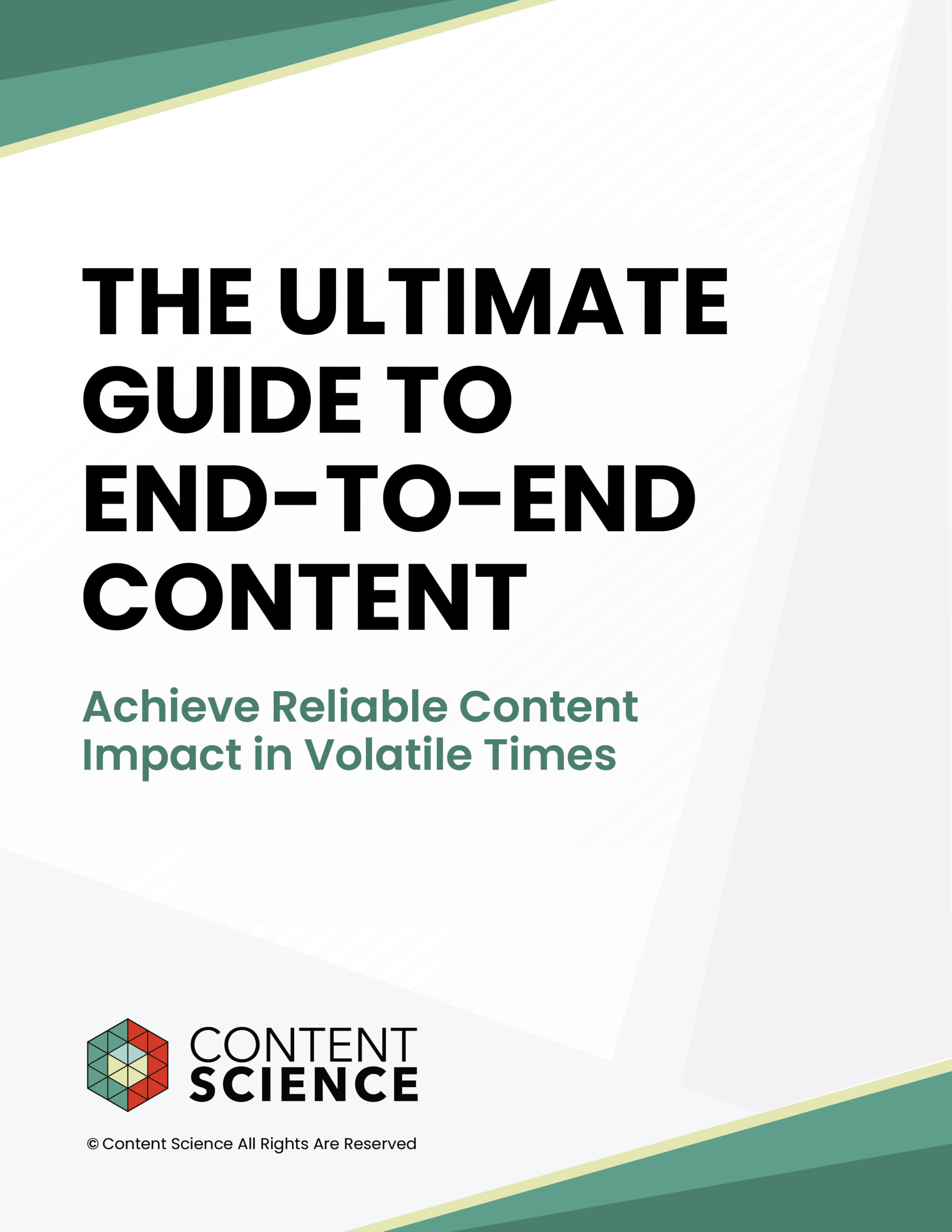
As the COVID-19 pandemic keeps workers at home and shoppers online, companies will continue to grapple with a pace of digital disruption they have never seen before.
To help you set a content vision and strategy to fit the new digital landscape, we have put together a list of essential content statistics, facts, and quotes.
Each year, Content Science releases these content statistics in the updated infographic 50 Crucial Content Facts. We thoroughly research and collect these content statistics and facts from Content Science studies as well as other reliable resources such as Forrester and Pew Research Center.
The facts are broken into five categories:
- Content Consumption
- Content Operations
- Content Intelligence + Effectiveness
- Content Channels
- Content Automation + Personalization
Here is our analysis of the content statistics and facts from this year’s updated fact sheet.
Content Consumption
The pandemic pushed millions more people to consume content online, with more consumers reading emails and using social media. In both March and April 2020, email opens were up 20% year-over-year, according to Campaign Monitor. And U.S. adults who use social media spent more time on these platforms in 2020. Podcasting has also become more popular. One in four Americans ages 12 and older (approximately 212 million people) are now familiar with podcasting, up from 70% in 2019. And, 37% (104 million) listen monthly, up from 32% in 2019.
But, as online content consumption has increased so has the amount of misinformation floating around. Disinformation has been a serious problem amid the pandemic. Nearly two in three American adults (64%) say fabricated news stories cause a lot of confusion when it comes to the basic facts of current news and events.
Content Operations
When the pandemic hit, thousands of organizations had to quickly pivot their business models and create new digital content. For companies that hadn’t yet fully embraced digital content, this shift left them with a massive content operations challenge. “If a company does not elevate content to a cohesive core competency, then the company is likely to suffer problems that make content ineffective and that make its operations inefficient at scale,” writes Content Science Founder Colleen Jones in The Content Advantage.
Many content teams are still struggling to develop an effective content operation. Just 11% of marketing/content teams plan content campaigns based on organizational objectives and prioritize them by those that fill strategic gaps, according to an Upland Kapost report. A content playbook can help with this. Our content operations research has repeatedly found that content leaders and their teams face no shortage of challenges. A content playbook helps overcome most of the top challenges by bridging strategy and execution.
Developing a playbook and creating a strong content operations foundation is essential as digital disruption goes into overdrive, with many companies looking to scale and optimize their content work. The best organizations will begin to focus on not just creating content, but on developing consistent content. “We expect that 2021 will bring with it a new customer experience leader on the executive team. This leader will be responsible for the voice of the company across all channels. The most successful companies will be the ones that can communicate with their consumers in a single voice across all channels,” says Christopher Willis, chief marketing officer at the AI-powered writing software company Acrolinx.
Content Intelligence + Effectiveness
Understanding and measuring content effectiveness is more important than ever as content competition continues to increase exponentially. But most teams are missing the boat completely when it comes to content intelligence. Only 35% of content teams regularly evaluate content effectiveness or impact. This has significant consequences. Content Science has found that when there isn’t a lot of thought to strategy only about 20% of content gets 80% of the results.
Not knowing whether your content is working for your customers or users brings real costs and risks to your business, including wasting money on content efforts because decisions are not guided by evidence. Once you start measuring, you can start making impactful changes. For example, we have found that the vast majority of people who said that content [in a digital experience] was not relevant indicated the content was too general, according to ContentWRX data. Insights such as this, can empower your content team to create more sophisticated and targeted content.
Content Channels
Developing a content strategy today is as much about where you are publishing the content as it is about the content itself. You need to know where your audience is and how they consume content on each different platform.
For example, millions of people now look to influencers on specific channels. By 2022, the influencer marketing industry could be worth up to $15 billion, up from as much as $8 billion in 2019. And seven out of 10 U.S. agency and marketing professionals advertise in influencer videos.
Email also continues to be a powerful content channel. Mailchimp saw its users send 333,635,013,935 emails in 2020. Knowing how your customers respond though is key. Marketers who send fewer than three emails receive a reply rate of just nine percent. But if a marketer sends between four and seven emails, their reply rate jumps to 27 percent.
Journalists are still an important content channel, however most companies are taking the wrong tack. Muck Rack found that 45% of journalists believe that the way most companies share information with the media is still outdated. Lack of personalization is the top reason journalists say they reject otherwise relevant pitches.
Even as long-existing channels such as email and social media continue to play important roles, companies need to keep an eye toward the future. For example, more than half of consumers are willing to use artificial/virtual reality (A/VR) technology to assess products.
Content Automation + Personalization
To deal with the crush of digital disruption and break through the increasingly crowded content marketplace, companies need to move toward automation and personalization. “AI is the only way we’re going to be able to deal with the fact that the demand for content is increasing exponentially. We’re going to have to automate the production of certain aspects of content,” says Noel McDonagh, director of information development at Dell EMC. And Gartner has found that companies fully invested in online personalization will outsell companies that have not by more than 30%.
How does your company achieve content personalization and automation? Gartner reports that: “Creating personalized messages and experiences requires intimate knowledge of customer journeys, relevant content that drives action, and technology that helps deliver and measure experiences. Brands need to be extremely thoughtful in how they personalize their content today…focus on showing customers you can help them first.
Even if you’re not ready for automation right now, there are ways to set up your content today to make it easier to automate tomorrow. “When we engineered and architected GovHub, we kept content fluidity as a goal,” says Georgia’s Chief Digital Officer Nikhil Deshpande.
“Even though websites are our primary way of delivering information, we need to be future-ready. Now you don’t need a special Alexa skill to read georgia.gov content because Alexa or Google Home automatically reads information from georgia.gov or GovHub hosted websites. The way we changed and modified our content made it machine visible and readable.”
According to Deloitte many companies are moving towards automation. Seventy-three percent of executives say their organizations have embarked on a path to intelligent automation, up 58% from 2019. Those organizations range from piloting, with 1 to 10 automations (37%), to scaling, with 51 or more automations (13%).
What’s holding back automation efforts? Executives are most likely to say process fragmentation and a lack of IT readiness are the top barriers to scaling intelligent automation per Deloitte’s reporting. And McKinsey found that investment in AI makes a major difference: Most respondents at high performers say their organizations have increased investment in AI in each major business function in response to the pandemic, while less than 30 percent of other respondents say the same.
Still, even with advances in automation and personalization, content professionals continue to play the most important role. “Marketing AI can take you a long way, but it’s up to humans to do the work of making the content, promoting it well, and connecting with an audience,” says Brandon Andersen, chief strategist at the content intelligence software company Ceralytics.
Get More Content Facts
Visit 50 Crucial Content Facts to get all 50 content statistics, facts, and quotes—and be sure to subscribe to Content Science Review for access to more fact sheets, best practice ebooks, research, trend reports, toolkits, templates, and case studies. Subscribers can also download our 50 Crucial Content Facts presentation ready slides.
If a company does not elevate content to a cohesive core competency, then the company is likely to suffer problems that make content ineffective and that make its operations inefficient at scale
-
Events, Resources, + More
The Ultimate Guide to End-to-End Content
Discover why + how an end-to-end approach is critical in the age of AI with this comprehensive white paper.
The Content Advantage Book
The much-anticipated third edition of the highly rated book by Colleen Jones is available at book retailers worldwide. Learn more!
20 Signs of a Content Problem in a High-Stakes Initiative
Use this white paper to diagnose the problem so you can achieve the right solution faster.
Upskill with Content Science Academy
Training for modern content roles through on-demand certifications + courses or live workshops.






Comments
We invite you to share your perspective in a constructive way. To comment, please sign in or register. Our moderating team will review all comments and may edit them for clarity. Our team also may delete comments that are off-topic or disrespectful. All postings become the property of
Content Science Review.